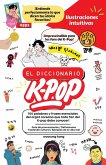Before reading this book, you've probably had moments of curiosity about Korean culture. Why does the Korean flag look like it has a Pepsi logo? Why do so many Korean kids share the same last names-Kim, Lee, and Park? If you're a K-Drama fan who watches variety shows too, your fascination with Korea may have grown even deeper. What does Korea actually mean? Who are the people on Korean banknotes? Why do Koreans love kimchi so much-and why with everything? Koreans also have their own way of figuring each other out. Forget small talk; they often ask your age or even blood type. (Yes, blood type! Some still believe it reveals personality-Type A perfectionists, Type O easygoing.) And now it's all about MBTI-from ENFP to ISTJ, it can even hint at workplace or dating compatibility. You might also wonder why you suddenly become a year (or two) older upon arriving in Korea. Why all the drama in street tent bars (pojangmacha)? How do Koreans drink so much soju from those infamous green bottles? And, of course, the 2020s question: Why is K-pop so insanely popular? (Hint: it's not just BTS-NewJeans, Stray Kids, LE SSERAFIM, and a wave of global idols are leading the charge. And yes, what does "Gangnam Style" even mean?) If you've seen Squid Game or Parasite, you know Korean entertainment is not just catchy-it's deep, emotional, and brutally honest. Even animation is joining the trend with shows like K-Pop Demon Hunters, blending Korean pop culture with global storytelling. When you get lost in translation, a dictionary or app can help-but cultural gaps aren't that easy. You might guess right once, but miss the why behind Korea's customs and behaviors. No matter who you are-a K-Pop or K-Drama fan, an expat, a study-abroad student, or a second-generation gyopo-you no longer need to stay puzzled by the quirks that make Korea, well, Korea. This book covers over 350 essential topics and FAQs, organized into 27 categories, exploring Korea through the Five Ws (Who, What, When, Where, Why) and How. By the end, you'll understand Korea-from history and values to food, slang, and modern trends. You'll also finally know why Koreans sit on the floor, why pouring with one hand is rude, and why K-Dramas' hidden cues make so much sense. After reading, dramas, movies, and K-Pop lyrics will feel completely different-and you'll spot the clichés before they happen! Next time you hang out with a Korean friend, you can casually impress them-like explaining why people tap the neck of a soju bottle or why to turn away when drinking with elders. And if someone says you have a "small face," you'll know to proudly reply: "Thank you!" Now, let's start with a perfect first example of Korean culture-the famous "Ppali Ppali" (¿¿¿¿) mindset. Hurry up and start reading!
Bitte wählen Sie Ihr Anliegen aus.
Rechnungen
Retourenschein anfordern
Bestellstatus
Storno

![[FULL COLOR] KOREAN CULTURE DICTIONARY - From Kimchi To K-Pop and K-Drama Clichés. Everything About Korea Explained! - Kang, Woosung [FULL COLOR] KOREAN CULTURE DICTIONARY - From Kimchi To K-Pop and K-Drama Clichés. Everything About Korea Explained! - Kang, Woosung](https://bilder.buecher.de/produkte/60/60685/60685854n.jpg)
![[FULL COLOR] KOREAN CULTURE DICTIONARY - From Kimchi To K-Pop a\nd K-Drama Clichés. Everything About Korea Explained! [FULL COLOR] KOREAN CULTURE DICTIONARY - From Kimchi To K-Pop a\nd K-Drama Clichés. Everything About Korea Explained!](https://bilder.buecher.de/produkte/68/68315/68315518m.jpg)





